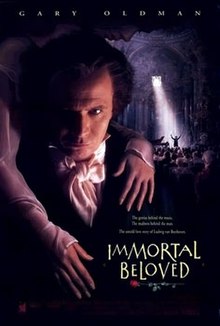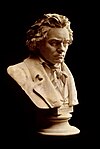Immortal Beloved (1994 film)
This article needs additional citations for verification. (June 2009) |
| Immortal Beloved | |
|---|---|
 Theatrical release poster | |
| Directed by | Bernard Rose |
| Written by | Bernard Rose |
| Produced by | Stephen McEveety Bruce Davey |
| Starring | |
| Music by | Ludwig van Beethoven Gioacchino Rossini |
Production companies | |
| Distributed by | Entertainment Film Distributors (United Kingdom)[1] Sony Pictures Releasing (United States)[2] |
Release date |
|
Running time | 121 minutes |
| Countries | United Kingdom United States |
| Languages | English Hungarian |
| Box office | $9.9 million[2] |
Immortal Beloved is a 1994 biographical film about the life of composer Ludwig van Beethoven (played by Gary Oldman). The story follows Beethoven's secretary and first biographer Anton Schindler (Jeroen Krabbé) as he attempts to ascertain the true identity of the Unsterbliche Geliebte (Immortal Beloved) addressed in three letters found in the late composer's private papers. Schindler journeys throughout the Austrian Empire interviewing women who might be potential candidates as well as through Beethoven's own tumultuous life.
Plot[]
When Ludwig van Beethoven dies, his assistant and close friend Schindler deals with his last will and testament. It reads that his estate, music and affairs will be left to his "immortal beloved," but there remains a question as to who is Beethoven's "immortal beloved," an unnamed woman mentioned in one of his letters. Schindler embarks on a quest to find out and meets the women who he knew had played a part in Ludwig's life.
Schindler first meets with Giulietta Giucciardi, who became a piano student of Beethoven's when she was a wealthy, young unmarried woman and fell in love with him. Despite Giulietta's father disapproving, she intends to marry Beethoven. She attempts to prove to her father that, despite rumors to the contrary, Beethoven can still play music himself, and hides with him while the composer plays the piano forte, believing he is alone. When he discovers Giulietta and her father, he is furious, feeling betrayed. He cuts ties with her and storms out. She calls after him to apologize, and only then realizes that Beethoven is deaf.
Schindler next meets Anna-Marie Erdödy, who took Beethoven in after becoming outraged with the audience mocking him at a poor performance, as the composer, now completely deaf, had become unable to properly conduct the orchestra. Anna-Marie's young son is killed during Napoleon's attack on Vienna and Beethoven comforts her in her grief, leading to a love affair, but she denies being his "immortal beloved."
Schindler's investigation brings him back to Beethoven's own family, recounting his disapproval of his brother marrying Johanna Reiss, the daughter of Anton Van Reiss, a prosperous Viennese upholsterer, even attempting to have her arrested at one point. After his brother's death, Beethoven is able to seize custody of his nephew Karl. Even though the boy is indifferent to music, his uncle becomes obsessed with making him a composer, neglecting his own career, which suffers.
Karl grows into a teenager, having spent hours daily practicing the piano. Beethoven is convinced that Karl will be a great success as a composer, but Karl knows he has no talent and, pushed to his breaking point by his uncle, attempts suicide. He survives but tells Beethoven he never wants to see him again.
Schindler discovers that Beethoven's great love was Johanna, and that Karl, conceived before her marriage, is actually his son, not his nephew. They had intended to elope, but Beethoven was delayed and wrote the "immortal beloved" letter to Johanna to let her know. However, Johanna never received it and, believing Beethoven had abandoned her, left and married his brother instead. Both feeling betrayed, their love grew to hate. Johanna tells Schindler that when she saw the performance of his ninth symphony, she was moved to forgive him and ultimately made peace with him on his deathbed, where he gave her a signed letter, giving her custody over Karl.
Schindler gives Johanna the letter to the "Immortal Beloved" in which she finally reads what happened that night they were supposed to meet. Shocked to find out how an unfortunate event and misunderstanding has kept them apart, she visits Beethoven's grave.
Cast[]
- Gary Oldman as Ludwig van Beethoven
- Jeroen Krabbé as Anton Felix Schindler
- Isabella Rossellini as Anna-Marie Erdödy
- Johanna ter Steege as Johanna Reiss
- Christopher Fulford as Kaspar van Beethoven
- Michael Culkin as Jakob Hotscevar
- Marco Hofschneider as Karl van Beethoven
- Miriam Margolyes as Nanette Streicherova
- Barry Humphries as Clemens Metternich
- Valeria Golino as Giulietta Guicciardi
- Alexandra Pigg as Therese Obermayer
- as Josephine von Brunsvik
- as Theresa von Brunsvik
Historical background[]
After Beethoven's death in 1827, a three-part letter was found among his private papers addressed to a woman whom he called "immortal beloved". Written in the summer of 1812 from the spa town of Teplice, the letter has generated a great deal of speculation and debate among scholars and writers as to her identity. Among the candidates, then and now, are Giulietta Guicciardi, , Josephine Brunsvik, Antonie Brentano, and Anna-Marie Erdödy, some of whom are portrayed in the film.
The film's writer and director, Bernard Rose, though not a historian, claimed that he had successfully identified the addressed woman as Beethoven's sister-in-law Johanna (Reiss) van Beethoven, a claim no scholar on Beethoven has endorsed. The film also implies that Karl, Beethoven's nephew, was in reality the couple's son. Biographer Gail S. Altman disputed Rose's claim in a book[3] devoted specifically to the question of the woman's identity and Beethoven's relationships in general.[4]
Music[]
- The Orchestra: London Symphony Orchestra, conducted by Georg Solti
- Instrumental soloists
- Murray Perahia, piano
- Gidon Kremer, violin
- Juilliard String Quartet
(in order of appearance)
- Symphony No 5, Op. 67.
- Für Elise (complete).
- Symphony No 3 In E-Flat Major Op.55 Eroica.
- Piano Sonata No 14, Moonlight: Adagio Sostenuto.
- Symphony No 6, Op. 68, Pastoral: Storm.
- Piano Trio No 5 In D Major, Op. 70, No 1 Ghost.
- Violin Concerto in D Major, Op. 61.
- Piano Sonata No 8, Pathetique.
- Piano Concerto No 5, Emperor (love theme, ending credits).
- Missa Solemnis: Kyrie.
- Symphony No 7, Op. 92: Allegretto (Karl's theme)
- Violin Sonata In A Major, Op. 47, Kreutzer: Adagio sostenuto- Presto.
- Symphony No 9, Op 125: Ode to Joy.
- String Quartet No 13 in B-Flat Major, Op. 130
Reception[]
Critical response[]
Reviews for Immortal Beloved were mixed. On Rotten Tomatoes the film has an approval rating of 56% based on 55 reviews, with an average rating of 6.2/10.[5] Audiences surveyed by CinemaScore gave the film a grade A- on scale of A to F.[6]
Emanuel Levy gave the film a "C" rating, calling it a "speculative chronicle" that lacks the "vibrant energy and charm" of Wolfgang Amadeus Mozart biopic Amadeus (1984). He praised the "wonderfully recorded and inventively used" Beethoven compositions as well as the casting of Oldman, who he felt was "the perfect actor to portray the arrogant, irascible musician".[7] Roger Ebert was highly complimentary of the film. He gave it 3½ stars out of four, stating in his review: "Immortal Beloved has clearly been made by people who feel Beethoven directly in their hearts". He asserted that Oldman "at first seems an unlikely choice...then we see that he is right".[8] Janet Maslin also offered a positive review, stating: "thanks to its hugely effective use of Beethoven's most thrilling, tumultuous music, this film exerts much the same hypnotic power". She praised the performance of Oldman, writing that "he captures Beethoven as a believably brilliant figure struggling with his deafness and other demons".[9]
MSN Movies, in a 2011 publication, wrote: "Oldman's performance is unimpeachable. He dives deep into the role with powerful passion and makes the audience feel the pain of the genius as he loses his hearing and fails to shape his nephew into a similarly talented musician. In the year of '[Forrest] Gump', Oldman was overlooked for a well-deserved Oscar nomination."[10] Also that year Josh Winning of Total Film named Oldman's portrayal of Beethoven as one of the five best performances of his career, saying: "Immersing himself fully into the role of the German composer, Oldman is here damn near unrecognisable. The fact that he remains silent for the first 20 minutes of the film while simultaneously emoting for England is a small triumph in itself."[11]
Box office[]
The movie debuted strongly[12] and was a modest success, generating $9,914,409 in a domestic-only release.[2]
Year-end lists[]
- 5th – Steve Persall, St. Petersburg Times[13]
- Top 10 (not ranked) – George Meyer, The Ledger[14]
See also[]
References[]
- ^ "Immortal Beloved (1994)". BBFC. Retrieved August 14, 2021.
- ^ Jump up to: a b c "Immortal Beloved (1994)". Box Office Mojo. Retrieved August 4, 2018.
- ^ Altman, Gail S. Beethoven: A Man of His Word – Undisclosed Evidence for his Immortal Beloved, Anubian Press 1996; ISBN 1-888071-01-X
- ^ See also Lewis Lockwood: "Film Biography as Travesty: Immortal Beloved and Beethoven." The Musical Quarterly 81/2, 1997, pp. 190–198.
- ^ "Immortal Beloved (1994)". Rotten Tomatoes. Fandango. Retrieved November 19, 2020.
- ^ "IMMORTAL BELOVED (1995) A-". CinemaScore. Archived from the original on December 20, 2018.
- ^ Levy, Emanuel. Immortal Beloved. EmanuelLevy.com. Wayback Machine. 2006. Retrieved 11 August 2014.
- ^ Roger Ebert (January 6, 1995). "Immortal Beloved". Chicago Sun-Times. Retrieved April 3, 2012.
- ^ Maslin, Janet (December 16, 1994). "Movie Review: Immortal Beloved". New York Times. Retrieved April 3, 2012.
- ^ Immortal Beloved (1994) - Ludwig van Beethoven Archived October 6, 2013, at the Wayback Machine. MSN Movies. 2011. Retrieved December 17, 2012.
- ^ Winning, Josh. Best Movies: The film chameleon’s greatest moments. Total Film. 11 April 2011. Retrieved 11 August 2014.
- ^ Natale, Richard (January 17, 1995). "Holiday Spurs Record-Setting Movie Weekend". Los Angeles Times. Retrieved June 7, 2012.
- ^ Persall, Steve (December 30, 1994). ""Fiction': The art of filmmaking". St. Petersburg Times (City ed.). p. 8.
- ^ Meyer, George (December 30, 1994). "The Year of the Middling Movie". The Ledger. p. 6TO.
External links[]
| Wikiquote has quotations related to: Immortal Beloved (1994 film) |
- 1994 films
- 1990s biographical drama films
- British films
- British biographical drama films
- American films
- American biographical drama films
- Musical films based on actual events
- Biographical films about musicians
- Depictions of Ludwig van Beethoven on film
- Cultural depictions of Klemens von Metternich
- Films directed by Bernard Rose (director)
- Films produced by Bruce Davey
- Columbia Pictures films
- Icon Productions films
- Films set in the 19th century
- Films set in Austria
- Films set in Germany
- Films shot in the Czech Republic
- Films with screenplays by Bernard Rose (director)
- 1994 drama films
- Films set in the Austrian Empire
